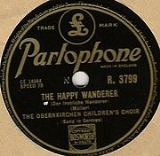
The Happy Wanderer
Encyclopedia

World War II
World War II, or the Second World War , was a global conflict lasting from 1939 to 1945, involving most of the world's nations—including all of the great powers—eventually forming two opposing military alliances: the Allies and the Axis...
. It is often mistaken for a German folk song, but it is actually an original composition. His sister Edith Möller conducted a small amateur children's and youth choir in Schaumburg County, Northern Germany, internationally named Obernkirchen
Obernkirchen
Obernkirchen is a town in the district of Schaumburg, in Lower Saxony, Germany. It is situated approximately 8 km southwest of Stadthagen, and 15 km east of Minden....
Children's Choir, in Germany named Schaumburger Märchensänger.
In 1953
1953 in music
-Events:*February 6 – Contralto Kathleen Ferrier, already terminally ill with cancer, leaves Covent Garden Opera House on a stretcher after being taken ill on the second night of her run in Gluck's Orfeo ed Euridice....
a BBC
BBC
The British Broadcasting Corporation is a British public service broadcaster. Its headquarters is at Broadcasting House in the City of Westminster, London. It is the largest broadcaster in the world, with about 23,000 staff...
radio broadcast of the choir's winning performance at the Llangollen International Musical Eisteddfod turned the cheerful encore into an instant hit. On January 22, 1954, the song entered the UK singles chart and stayed on the chart - only a Top 12 at the time - for 26 non-consecutive weeks. With the BBC's strong international influence "The Happy Wanderer" suddenly turned up everywhere, e.g. as the winning song of the 1955 calypso
Calypso music
Calypso is a style of Afro-Caribbean music that originated in Trinidad and Tobago from African and European roots. The roots of the genre lay in the arrival of enslaved Africans, who, not being allowed to speak with each other, communicated through song...
road-march season of the Trinidad Carnival. People protested after this event and complained that only calypsoes should be chosen over foreign music.
The amateur choir, many of whose original members were war orphan
Orphan
An orphan is a child permanently bereaved of or abandoned by his or her parents. In common usage, only a child who has lost both parents is called an orphan...
s, turned into an unlikely international phenomenon in the following years. The group performed on many international tours under the name Obernkirchen Children's Choir. They made two appearances on The Ed Sullivan Show
The Ed Sullivan Show
The Ed Sullivan Show is an American TV variety show that originally ran on CBS from Sunday June 20, 1948 to Sunday June 6, 1971, and was hosted by New York entertainment columnist Ed Sullivan....
(November 29, 1964, and December 11, 1966).
Die Isarspatzen, Herbert Beckh und das Tanzorkester des Bayerischer Rundfunk
Bayerischer Rundfunk
Bayerischer Rundfunk [Bavarian Broadcasting] is the public broadcasting authority for the German Freistaat of Bavaria, with its main offices located in Munich. BR is a member of ARD.- Legal foundation :...
s have also recorded a German
German language
German is a West Germanic language, related to and classified alongside English and Dutch. With an estimated 90 – 98 million native speakers, German is one of the world's major languages and is the most widely-spoken first language in the European Union....
version. That version was made in Munich
Munich
Munich The city's motto is "" . Before 2006, it was "Weltstadt mit Herz" . Its native name, , is derived from the Old High German Munichen, meaning "by the monks' place". The city's name derives from the monks of the Benedictine order who founded the city; hence the monk depicted on the city's coat...
on June 16, 1954. It was released by Electrola Records as catalog number EG 8073.
The song's German lyrics were written by Edith Möller and Florenz Siegesmund and have been translated into several languages, and it has since become a choir classic. The English lyrics were written by Antonia Ridge. Milton DeLugg
Milton DeLugg
Milton DeLugg is an American composer and arranger.-Biography:A talented accordionist, he appeared in short Soundies musicals and occasional movies . He quickly became a successful arranger and composer...
wrote a famous arrangement, and is sometimes falsely credited as the composer of the song.
External links
- Chart Of All Time - 1954 UK Chart History of 1954
- IMDB Movie: "Der fröhliche Wanderer"
- Llangollen History of the Llangollen International Musical Eisteddfod
- Trinidad and Tobago National Library Carnival Story - The Negative List
- MusicBrainz Obernkirchen Children's Choir

